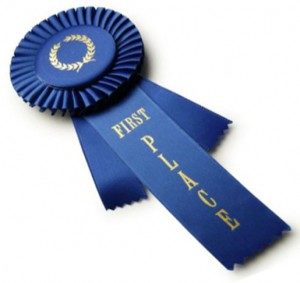

 We hope you enjoyed PART ONE and PART TWO of our Best Books of 2017 list. As I explained at the outset, I am aware that this list is neither adequate nor complete. In the time I’ve got, with the energy I’ve got, after much consternation and conversation, I settled on a handful of my favorite reads, books we think deserve some accolades. There are others I loved and other that many have agreed are excellent, but I curated our particular list the best I could. We appreciate your interest and your support of our bookstore.
We hope you enjoyed PART ONE and PART TWO of our Best Books of 2017 list. As I explained at the outset, I am aware that this list is neither adequate nor complete. In the time I’ve got, with the energy I’ve got, after much consternation and conversation, I settled on a handful of my favorite reads, books we think deserve some accolades. There are others I loved and other that many have agreed are excellent, but I curated our particular list the best I could. We appreciate your interest and your support of our bookstore.
I wanted to offer a final page or two of good books and thoughtful authors that deserve special accolades. But this list is special, limited to one key topic. Let me explain.
You may know that one of my own “life verses” is 1 Chronicles 12:32 that remembers the Biblical sons of Issachar for being the kind of people who “understood the times and knew what God’s people should do.” Women and men who have this reputation are those who have read the world and read the Word; they are, in fact, readers. And they read with discernment, seeing life in light of God’s Word. In a way, our bookstore exists to equip folks to become sons and daughters of Issachar, those who know a bit about the world in which we live and understand what a wise and faithful response might be to the issues of the day.
I don’t know if the quote is fully accurate but Martin Luther is said to have said that “if we proclaim the gospel, as well we should, but fail to relate it to the burning issues of the day, we haven’t preached the gospel at all.”
That is, of course, because the gospel must always be incarnated. It is not an abstract set of doctrines that float in the air to which we are asked to give mere intellectual assent. Rather, the gospel is found in the person of Christ and that always means that faith is down-to-Earth, real-world, contextualized. The gospel of the Kingdom that Jesus announced and inaugurated is timeless, but always timely.
And so, in the spirit of relevant, missional, incarnate, contextualized, Kingdom living, in light of the call to be sons and daughter of Issachar, we want to name one (among many) burning issues of the day, and highlight a handful of excellent books that have come out this year to help us understand our world and this issue. Agree or not with all of them, they are surely significant, important, notable. The topic is as timely as it gets and we would be irresponsible as booksellers not to promote these kinds of books. No book list of the Best Books of 2017 would be adequate without honorably mentioning these kinds of books.
I’m speaking of books about race, racism, multi-ethnic ministry, cross-cultural concerns, racial justice and the like. Our assumption is that public justice and social righteousness and racial reconciliation are core values of the Kingdom of God and any truly gospel-centered worldview will have these concerns at the heart of things.
And, we also assume that, in fact, things are bad out there. Churches and Christian folks – even Issacharians – are struggling to know what to think, what to say, what to do as we enter these conversations, respond to egregious acts of prejudice, live in a culture steeped in what Jim Wallis has potently called “America’s Original Sin.”
And these books can help.
We award these books as significant resources in the journey towards greater Christian fidelity, and honor the publishers and authors who have released them this year. We hope you order some from us today.
We show the regular retail price but if you click on the link at the bottom, it will take you to our secure order form page. Just tell us what you want and we will deduct the discount and ship them out (usually) via USPS. Let us know how we can help.
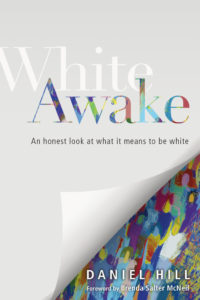 White Awake: An Honest Look at What It Means to Be White Daniel Hill (IVP) $16.00 I wrote quite a lot about this amazing book when it was released late last summer (see that BookNotes column, here) and we believe it to be one of the best books of the year, one of the most engaging books I have read all year, and one of the most useful resource for anyone wanting to understand white privilege, serious and costly efforts towards racial justice, and the vision of equality and mutuality among different races.
White Awake: An Honest Look at What It Means to Be White Daniel Hill (IVP) $16.00 I wrote quite a lot about this amazing book when it was released late last summer (see that BookNotes column, here) and we believe it to be one of the best books of the year, one of the most engaging books I have read all year, and one of the most useful resource for anyone wanting to understand white privilege, serious and costly efforts towards racial justice, and the vision of equality and mutuality among different races.
This book is curious, beautiful, even, in that I don’t think it comes on too strong, although it is hard-hitting. It is informed and sophisticated, but yet easy to read. Hill is candid about his own failings and yet has come to be an authentic white ally in the struggle for multi-ethnic justice. I think this is a very good book, a bit more than a true beginners volume, but not so complex that it is too daunting for most. That is, it’s almost perfect for most of us. Congratulations to Daniel Hill and IVP for offering this truly great book.
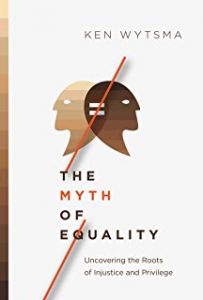 The Myth of Equality: Uncovering the Roots of Injustice and Privilege Ken Wytsma (IVP) $18.00 I reviewed this amazing book this Spring and said then, after listing a few introductory books on racism, that: “I want to tell you about one of the most important books I’ve come across in this area, a book that I’ve highlighted already, but feel as if I should tell you about it again. It is not scholarly or difficult and while we are fans of the ones listed above, this new one should be bumped up to the top of your stack. You should consider it sooner rather than later.“
The Myth of Equality: Uncovering the Roots of Injustice and Privilege Ken Wytsma (IVP) $18.00 I reviewed this amazing book this Spring and said then, after listing a few introductory books on racism, that: “I want to tell you about one of the most important books I’ve come across in this area, a book that I’ve highlighted already, but feel as if I should tell you about it again. It is not scholarly or difficult and while we are fans of the ones listed above, this new one should be bumped up to the top of your stack. You should consider it sooner rather than later.“
Now, months later, I still maintain that The Myth of Equality is one of the best books I’ve read all year.
Ken Wytsma is one of those amazing authors that you should commit to reading whatever he writes – he has a great, great book on justice, a theology book that philosophy Nic Wolterstorff says is among the best he’s ever read, and he has a surprisingly great little book about being creative. This, his most recent, is simply stunning in its insight, it’s power, it’s significance. Although I am very, very fond of Daniel Hill’s lovely book (see above) I think I want to say that this is the most significant Christian book on racism published this year. Or, in many a year. It’s that good.
Please see my review of it, and several other books on racism, in this BookNotes post from this Spring; I trust you will appreciate seeing these various books noted and The Myth of Equality described. Send an order to us today and see if you don’t agree that it is truly one of the vital books necessary for “sons and daughters of Issachar.” Congrats to Ken for doing this very good work.
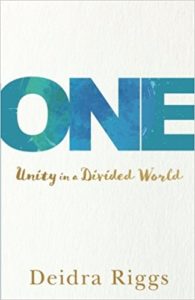 One: Unity in a Divided World Deidra Riggs (Baker Books) $14.99 I am very interested in racial justice and I know that many readers of BookNotes have appreciated our reviews of books such as Just Mercy by Bryan Stevenson and Dear White Christian by Jennifer Harvey and our regular enthusiasm for black authors like Brenda Salter McNeil and Lisa Sharon Harper. We have touted heavy books like Forgive Us: Confessions of a Compromised Faith edited by Elise Mae Cannon and others (Zondervan; $22.99) and Prophetic Lament: A Call for Justice in Troubled Times by Soong-Chan Rah (IVP; $17.00) and have provided books to Presbyterian (USA) churches (especially) who are reading, as a whole denomination, Waking Up White, and Finding Myself in the Story of Race, a memoir by Debby Irving. We know it’s hard stuff, but we regularly display The Cross and the Lynching Tree by James Cone and Stand Your Ground by Kelly Brown Douglas, a powerful, scholarly, woman writing about “black bodies and the justice of God.”
One: Unity in a Divided World Deidra Riggs (Baker Books) $14.99 I am very interested in racial justice and I know that many readers of BookNotes have appreciated our reviews of books such as Just Mercy by Bryan Stevenson and Dear White Christian by Jennifer Harvey and our regular enthusiasm for black authors like Brenda Salter McNeil and Lisa Sharon Harper. We have touted heavy books like Forgive Us: Confessions of a Compromised Faith edited by Elise Mae Cannon and others (Zondervan; $22.99) and Prophetic Lament: A Call for Justice in Troubled Times by Soong-Chan Rah (IVP; $17.00) and have provided books to Presbyterian (USA) churches (especially) who are reading, as a whole denomination, Waking Up White, and Finding Myself in the Story of Race, a memoir by Debby Irving. We know it’s hard stuff, but we regularly display The Cross and the Lynching Tree by James Cone and Stand Your Ground by Kelly Brown Douglas, a powerful, scholarly, woman writing about “black bodies and the justice of God.”
Having said all that, I believe there are many who aren’t going to want to wade through the heavy study of Lamentations by Rah and aren’t quite up for the liberation theology of Cone, who would be turned off by a study that seems partisan or strident. That Jennifer Harvey is pretty academically dense and that Debby Irving doesn’t have a strong religious component makes them both less useful in some faith communities, I’m sure.
Which is why Deidra Riggs new book is so, so useful. It is wonderfully written, upbeat, even, without being overly cheery about a painful subject. In a way, although she is a black woman, this book is less about race or racism as such, and more foundational, more basic. It is a call to our essential human oneness, and the oneness that we should know within the church of Jesus Christ. and how that can spill over into being agents of reconciliation in other areas of division or conflict. This book about unity is exciting and inspirational and will help us – get this! — resist polarization. Wow.
Missional woman par excellence, Jo Saxton, says, simply,
If you’re searching for tools to help you rebuild unity in today’s divided world, learn from Deidra. She’s a wise, humble, and hope-filled guide.
That’s one reason we want to honor One as one of the really good books of 2017. It is hopeful in a time when many of us are desperate for signs of hope, who hunger for even a little common ground. The author is wise and humble; again, this isn’t always obvious in all such books, and Riggs’s attitude seems so Christ-like. Her approach is rooted in, she says, “God’s inexhaustible love.” When we truly know that God loves us lavishly, we can share that love with others – it sounds simple, but this gracious approach is nothing short of revolutionary. It is not surprising that the great John Perkins has a hefty and energetic endorsement.
One is a really nice book, with a fine voice of an energetic, honest, authentic young woman. She invites us to love those we find it hard to love – who is it for you? She is aware of the political, social, and cultural forces that polarize us, she is personally aware of the pain of racism, and yet she is full of the kind of hope that comes from knowing the belovedness that comes from being one with God. Want unity? Want oneness? Want to find some sense of wholeness? Want a life of adventure and passion for making the world a better place? This book – and its excellent study guide –is quietly remarkable. We recommend it especially for those who may not want a heavy anti-racism training resource or who might be scared away by too strident a tone. Thank you, Deidra, for pouring your heart out in such a helpful, beautiful way.
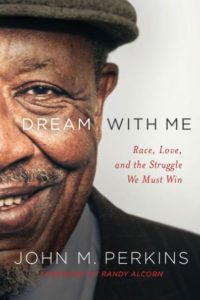 Dream With Me: Race, Love, and the Struggle We Must Win John M. Perkins (Baker Books) $19.99 Any time there is a new book by elder Christian leader John Perkins it is time for celebration and honoring. His many, many books, his tireless speaking, his brave action, his organizational leadership in starting and sustaining various ministries (most notably Voice of Calvary in Mendenhall Mississippi) combine to make him, doubtlessly, one of the most esteemed and consequential evangelical leaders of the last 100 years. I think Billy Graham and other internationally known evangelical spokespeople would concur: John is a great man, and a leader who has left his impact with exceptional fruitfulness and lasting influence. From his first biography (still in print) Let Justice Roll Down to his 2017 Dream With Me he has consistently honored Christ, proclaimed the gospel, taught the Bible, and pushed people of all sorts to be more radical in their pursuit of justice and peace and racial reconciliation.
Dream With Me: Race, Love, and the Struggle We Must Win John M. Perkins (Baker Books) $19.99 Any time there is a new book by elder Christian leader John Perkins it is time for celebration and honoring. His many, many books, his tireless speaking, his brave action, his organizational leadership in starting and sustaining various ministries (most notably Voice of Calvary in Mendenhall Mississippi) combine to make him, doubtlessly, one of the most esteemed and consequential evangelical leaders of the last 100 years. I think Billy Graham and other internationally known evangelical spokespeople would concur: John is a great man, and a leader who has left his impact with exceptional fruitfulness and lasting influence. From his first biography (still in print) Let Justice Roll Down to his 2017 Dream With Me he has consistently honored Christ, proclaimed the gospel, taught the Bible, and pushed people of all sorts to be more radical in their pursuit of justice and peace and racial reconciliation.
When I announced this a year ago, early in 2017, I wanted readers to know how much this new book matters to us. I wrote:
There is hardly anyone I esteem more within the broader evangelical Christian community that John Perkins. When I was doing my own little book, a collection of inspirational speeches turned into essays for young adults, I said quite simply that I had to have a chapter by John Perkins. I had a number of pretty famous contributors but John’s role was a deal-breaker for me. Graciously he and his staff gave us a tape to transcribe and we happily put it in Serious Dreams: Bold Ideas for the Rest of Your Life. I say this to assure you that I’m not blowing smoke here: you should read Dr. Perkins’s books and this brand new one looks tremendous. It came two days ago so is brand, brand new.
I’m not alone in insisting that John is an important voice. The very thoughtful author Randy Alcorn (his big book Heaven is very good and I loved his massive work from last year, a profound study simply called Happiness) says in the foreword, “There aren’t many people other than Jesus and my wife – who I can say changed my life. John Perkins is one of them.”
The esteemed Philip Yancey (whose last book was Vanquishing Grace) says:
At a time when the racial divide in the United States is widening into a chasm, I cannot think of a more needed message than this book.
Exactly.
Read the rest of that review, along with other books on this topic, here.
Three big hollas to Dr. Perkins for his faithfulness over the last generation and for this wonderful overview of his life and work. More, thanks be to God for the chance to read about Dr. Perkin’s hope in what God is doing in this rising generation and the way Dream With Me points us to the transforming power of the gospel as we live in love, “the struggle we must win.”
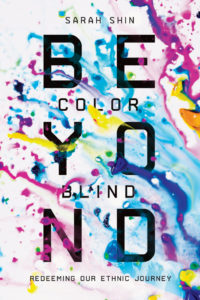 Beyond Color Blind: Redeeming Our Ethnic Journey Sarah Shin (IVP) $16.00 Just released in December, this is one of the last books of 2017 and surely one of the very best. We are so glad for Sarah Shin’s beautifully-written work, and how she explains ethnicity, diversity, cultural backgrounds, and more. As an Asian American with IVCF, she serves as an evangelist, although is known for doing workshops on justice, ethnicity, the arts, and more. She has a master’s degree in theology from Gordon-Conwell and another master’s in city planning and development from MIT. She now lives in Cambridge. Not too shabby, eh?
Beyond Color Blind: Redeeming Our Ethnic Journey Sarah Shin (IVP) $16.00 Just released in December, this is one of the last books of 2017 and surely one of the very best. We are so glad for Sarah Shin’s beautifully-written work, and how she explains ethnicity, diversity, cultural backgrounds, and more. As an Asian American with IVCF, she serves as an evangelist, although is known for doing workshops on justice, ethnicity, the arts, and more. She has a master’s degree in theology from Gordon-Conwell and another master’s in city planning and development from MIT. She now lives in Cambridge. Not too shabby, eh?
Everyone that knows Shin, I am told, thinks the world of her. Like a number of books on this “best of” list, she is both astute and clear; she is able to reach open-minded beginners and yet hold the interest of more sophisticated students of this topic. It is a very special book and I will be touting it as a “must read” anytime I get the chance.
Beyond Color Blind is arranged in two main parts. The first half is called “Redeeming Our Ethnic Stories” and she explores how ethnicities are made by God for our good. There are “cracks” in our ethnicity, and she outlines several damaged and hurtful ways to approach our ethnic selves. She has a chapter called “Ethnicities Restored for Better” and another called “Redeemed Ethnic Identities Sent Out to Heal.” For those paying close attention, this follows a grid of “creation/fall/redemption/restoration and it is exceptionally helpful.
The second half of this helpful, exciting book is called “Stewarding Our Ethnic Identities.” She talks about trust-building with ethnic strangers, outlines some cross-cultural skills needed to form community, explains how to respond to cross-cultural conflict, and ends with two chapters which I’ve not yet read – but am positive will be nothing short of stellar. One chapter is called “Prophetic Ethnic Justice” and the next is evocatively called “Cultural Re-creators.”
I hope you sense that this is a fresh and helpful, theologically sound, even pleasant, call to this important work. Justice and “re-creation” is more than just resisting black vs. white racism, nor only about urban police brutality and the like. We are all uniquely ethnic and we are call called by God to steward the giftedness we are. Wow, this is exciting, important stuff. Very highly recommended.
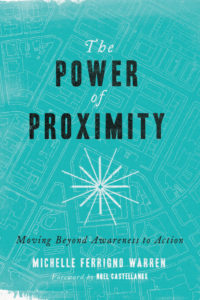 The Power of Proximity: Moving Beyond Awareness to Action Michelle Ferrigno Warren (IVP) $16.00 Anyone who follows the good work of the Christian Community Development Association (CCDA) probably knows this woman and her legendary work in organizing marginalized communities. As a white-skinned woman she has lived for decades as a minority in urban neighborhoods predominantly made up of people of color. This long awaited book that came out this year is a must-read, just a very moving story of her commitments to relationships, to living “proximate to the pain of the poor.” It’s a good story, instructive, maybe a bit challenging, but a good reminder of very important things.
The Power of Proximity: Moving Beyond Awareness to Action Michelle Ferrigno Warren (IVP) $16.00 Anyone who follows the good work of the Christian Community Development Association (CCDA) probably knows this woman and her legendary work in organizing marginalized communities. As a white-skinned woman she has lived for decades as a minority in urban neighborhoods predominantly made up of people of color. This long awaited book that came out this year is a must-read, just a very moving story of her commitments to relationships, to living “proximate to the pain of the poor.” It’s a good story, instructive, maybe a bit challenging, but a good reminder of very important things.
Much of this interesting book is about Michelle Warren’s advocacy for the poor, and how she and her family have lived in transitional neighborhoods, sharing life with those who are often hurting. She is one who has pursed justice inspired by a missional Kingdom vision, and “leans in” to the suffering of the world. The many enthursiastic endorsements on this book are just stunning, with all sorts of folks from varying social locations, all saying how much they appreciate it, and how The Power of Proximity (in the words of M. Daniel Carroll R.) “beckons us to join the pilgrimage to walk alongside the vulnerable.”
There is certainly a sub-text about racial justice in much of this, even if the book is more about her journey of learning to leverage her own privilege as an organizer for the poor. The few chapters on race are brilliant, and the chapter “Race Matters” is breath-taking in its honesty, the stories she tells, and the vulnerability with which she shares her own efforts to have solidarity with friends in the #BlackLivesMatters movements. This chapter is worth the price of the book. Kudos to CCDA and to Ms Warren for this very useful testimony and for a book that could have been guilt-producing and intimidating, but is winsome, candid, inviting. Good job.
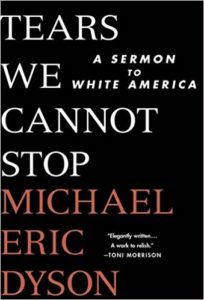 Tears We Cannot Stop: A Sermon To White America Michael Eric Dyson (St. Martin’s Press) $24.99 How can I explain again why this book is so very important, why this provocative piece is deserving of being included in the Best of 2017 list?
Tears We Cannot Stop: A Sermon To White America Michael Eric Dyson (St. Martin’s Press) $24.99 How can I explain again why this book is so very important, why this provocative piece is deserving of being included in the Best of 2017 list?
Here is what I wrote in a previous BookNotes review:
Well, if conventional, evangelical sermonizing taught by the likes of seminary prof Will Willimon (in his new book Who Lynched Willie Earle?) isn’t your literary cup of tea, then perhaps this master of passionate, bold, literary prose who is a sociology professor (at Georgetown University) will grab your heart and imagination. Dyson, an old Philly guy, is known for writing fun and informative stuff on a wide variety of topics. He’s written about race and power and religion but often gets at that by way of pop culture, sports and music and more. I loved his old book on Tupac (Holler If You Hear Me) and we used to carry his one on Marvin Gaye. Between God and Gangster Rap was a pivotal resource. He’s written bunches of other work – hardly any other black public intellectual has been so prolific – including well received books about Malcolm X and about King and, in 2016, an important work on Obama called The Black Presidency: Barak Obama and the Politics of Race in America. The former President, himself (who reads widely as we know) has said, “Anyone who speaks after Michael Eric Dyson pales in comparison.”
This brand new one is fierce and passionate and raw and personal. Because I do not know all of his many previous works I cannot say for sure, but some are saying it is his most elegant and yet his most fierce. I do not mean to distract at all from Dyson’s own intellectual and literary gifts or contribution, but the excerpt I read reminded me of one of the most discussed books on this topic in recent years, Ta-Nehisi Coates’ Between the World and Me. Not unlike Coates, some reviewers are making comparisons to the seminal work of James Baldwin. The Fire This Time, maybe? If you are interested in this topic, you must read Dyson, who demands we hear his pain, honor his people and their journey, and take up a hopeful vision with words asking “How can we make it through the long night of despair to the bright day of hope?”
The great literary figure Toni Morrison writes that it is:
Elegantly written, Tears We Cannot Stop is powerful in several areas, moving personal recollections; profound cultural analysis; and guidance for moral redemption. A work to relish.
And, speaking of amazingly powerful, award winning authors, read this from Stephen King:
Here’s a sermon that’s as fierce as it is lucid. It shook me up, but in a good way. This is how it works if you re black in America, this is what happens, and this is how it feels. If you’re black, you’ll feel a spark of recognition in every paragraph. If you’re white, Dyson tells you what you need to know — what this white man needed to know, at least. This is a major achievement. I read it and said amen.
And you know what? While Dyson may be fairly broad in calling this gut-wrenching cry from the heart a “sermon” it is, in fact, written by one who is not only a cultural critic, scholar, and writer, but a real preacher. Eric Michael Dyson – the Reverend Eric Michael Dyson — has been an ordained minister for thirty-five years. And he can preach. Perhaps these are hard truths for some of us to hear, but I hope you will try.
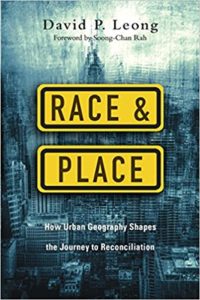 Race and Place: How Urban Geography Shapes the Journey to Reconciliation David P. Leong (IVP) $16.00 This book deserves any number of awards for its keen insights, its interdisciplinary approach, and its significant contribution to what might seem obvious, but has not been adequately plumbed in recent years. This book is extraordinary, and when I reviewed it last winter, I said how good it was. In my review I said how great it was going to be, all future tense, as it had just come out. A year on, I’m even more confident that it is exceedingly important and very well deserving of acclaim. I wish I’d have promoted it even more this past year as it is truly one of the great books of 2017. We are happy to give Race and Place one of our Hearts & Minds bookstore Awards.
Race and Place: How Urban Geography Shapes the Journey to Reconciliation David P. Leong (IVP) $16.00 This book deserves any number of awards for its keen insights, its interdisciplinary approach, and its significant contribution to what might seem obvious, but has not been adequately plumbed in recent years. This book is extraordinary, and when I reviewed it last winter, I said how good it was. In my review I said how great it was going to be, all future tense, as it had just come out. A year on, I’m even more confident that it is exceedingly important and very well deserving of acclaim. I wish I’d have promoted it even more this past year as it is truly one of the great books of 2017. We are happy to give Race and Place one of our Hearts & Minds bookstore Awards.
Please re-read what I wrote in BookNotes when it first came out:
IVP can always be counted on to offer some of the most astute, insightful, and useful books on racial justice, multi-ethnic ministry, and authentic visions of reconciliation. They keep offering new ones, with new angles, fresh authors, important aspects of this big call to embody diversity and be effective in evangelical ministry in a culturally a racially diverse culture. So I trust them. A lot.
And this brilliant new book makes that case nicely, that they are on the cutting edge of doing useful work – not arcane philosophical studies but serious scholarship to be used by those doing real-world ministry. Race and Place reminds us of an important aspect of our work on this topic, namely, that “geography matters.” If we “long for diverse, thriving neighborhoods and churches” we have to deal with “geographic structures and systems that create barriers to reconciliation and prevent the flourishing of our communities.”
Folks who are doing important work living and writing about missional outreach (like Tim Soerens, author of The New Parish) understand how important all this is. Soerens notes,
For way too long, conversations about race haven’t included place, and vice versa. With the insight of a scholar and wisdom that only comes from putting ideas into practice, Dr. Leong offers an invitation to the belonging, solidarity, and hope we so desperately need today.
I am so excited to read this, not only because I think he has much new to teach us, but because I am particularly interested in “a sense of place” and write and preach about ministry contextualized to place – from small towns to rust belt cities to rural places – and about social justice and racial equality. To see these two themes brought together – Wendell Berry and Martin Luther King, if you will – is a great, great joy and I’m sure I will love reading this book. I bet you will too!
David Leong had previously written a short but even more academic study of place and urban geography/culture a few years back, a book we stock called Street Signs: Towards a Missional Theology of Urban Cultural Engagement (Wipf & Stock; $32.00.) This new one, though, Race and Place, about our racialized cities – and how we are impacted now by decisions made generations ago about streets and school districts and neighborhoods and shopping centers and more – is going to be so helpful for anyone wanting to embody a sense of care for the places God has sent us. Unpacking the systemic challenges of patterns of race relations – what some might call the social architecture or what others might suggest are “principalities and powers” is vital. Race and Place: How Urban Geography Shapes the Journey to Reconciliation is going to be a very valuable contribution to our ongoing work as Kingdom people. Order it today.
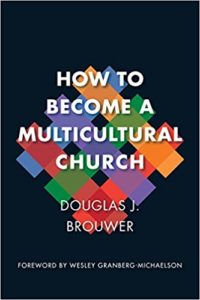 How to Become a Multicultural Church Douglas J. Brouwer (Eerdmans) $20.00 I have long appreciated the wise and careful voice of Doug Brouwer; he is a very good, clear writer and has other reasonable, thoughtful books about faith formation, marriage, asking questions about vocation, and more. He has been the pastor of the wildly diverse International Protestant Church in Zurich, Switzerland (one of Europe’s largest cities), which gives him a rather unique, multi-ethnic and multi-national vantage point. He’s learned a lot about social and cultural diversity, and here he tells both the difficulties and the beauties of crafting an embodiment of the Kingdom that allows us to bear witness to God’s reconciling ways. Just when I thought we had enough books on creating a more multi-ethnic church (write to me if you want other suggestions) this one comes along and delightfully surprises me. What a good book!
How to Become a Multicultural Church Douglas J. Brouwer (Eerdmans) $20.00 I have long appreciated the wise and careful voice of Doug Brouwer; he is a very good, clear writer and has other reasonable, thoughtful books about faith formation, marriage, asking questions about vocation, and more. He has been the pastor of the wildly diverse International Protestant Church in Zurich, Switzerland (one of Europe’s largest cities), which gives him a rather unique, multi-ethnic and multi-national vantage point. He’s learned a lot about social and cultural diversity, and here he tells both the difficulties and the beauties of crafting an embodiment of the Kingdom that allows us to bear witness to God’s reconciling ways. Just when I thought we had enough books on creating a more multi-ethnic church (write to me if you want other suggestions) this one comes along and delightfully surprises me. What a good book!
My friend Wes Granberg-Michaelson wrote the foreword, and I trust his recommendation. He writes:
…this book is not some ‘how to’ manual for tinkering with congregational life, but, rather, a survival guide for congregational witness in today’s world.
After helpfully, even urgently, describing trends in Western modernity and how we are, indeed, becoming increasingly multi-cultural, everywhere, and how there has been a sometime violent counter-reaction to this, Wes says that:
One may wonder what Brouwer’s winsome, honest, and inspiring account of the International Protestant Church in Zurich has to do with any of this. The answer is a lot. In my view, the witness of the gospel in the world, and the focal point for God’s mission, always has its roots in the local congregation.
He cites Leslie Newbigin’s famous line about the only hermeneutic of the gospel is a congregation of men and women who believe it and live by it, and then reminds us that “if the witness and power of Christian faith is to be understood in the public square, it must be seen in the life of the congregations shaped by its truth, just as it was first incarnated in a person.”
I have to admit, as much as I like Brouwer, and admire this work he’s done in this remarkably multi-ethnic, conflicted, curious, church, it was Granberg-Michaelson’s fine endorsement that drew me into it. It really does show how thoughtful and important How to Become a Multicultural Church is; why it is a great book about ethnicity, about diversity, about racial and cultural reconciliation. And it is a book about this particular missional congregation, that views itself as a Kingdom outpost, and has had to work at being what it is becoming.
There are some standard things about diversity, conflict, being hospitable and such, all very good and wise counsel, explored by way of really interesting examples. But there’s some things that don’t appear in other books about congregational diversity and this makes it that much more useful. I suppose it should not surprise us that at the heart of this vision and among the chief convictions and attitudes and practices, are hospitality and community – even around the Lord’s Table. Wow.
How to Become… tells the story of one congregation, admittedly one that is most likely different then yours. But this wise, experienced Reformed pastor has learned much and nicely tells us how churches everywhere can “adjust their attitudes and practices to embrace different kinds of diversity and worship together as God’s people.” Highly recommended.
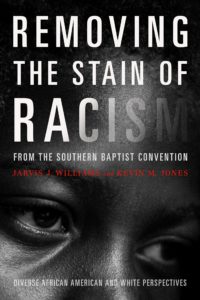 Removing the Stain of Racism from the Southern Baptist Convention: Diverse African American and White Perspectives edited by Jarvis Williams and Kevin Jones (B+H Publishing) $24.99 I am not Southern Baptist so did not read this, although we stocked it, even though we seem not to have many Southern Baptist customers. However, we want to honor this publisher and this denomination and the authors who contributed to this collection for its brave, Biblical stance and it’s willingness to confess, repent, and struggle with issues within their own faith tradition. This is exceptionally notable and I respect them for their candid conversations, much needed, apparently.
Removing the Stain of Racism from the Southern Baptist Convention: Diverse African American and White Perspectives edited by Jarvis Williams and Kevin Jones (B+H Publishing) $24.99 I am not Southern Baptist so did not read this, although we stocked it, even though we seem not to have many Southern Baptist customers. However, we want to honor this publisher and this denomination and the authors who contributed to this collection for its brave, Biblical stance and it’s willingness to confess, repent, and struggle with issues within their own faith tradition. This is exceptionally notable and I respect them for their candid conversations, much needed, apparently.
Here is what is also interesting about this. Not only is it important for the nation’s largest Protestant denomination, but other astute observers have said that we all have much to learn from their own process of coping with their legacy of sinfulness on this topic. Thanks be to God that we all can learn from them; many of us should celebrate these faithful steps with them. Our naming this book to our list from our little corner of the world is one way of affirming their good work and offering honor to this obviously historic book from within the theologically conservative SBC.
Listen to these accolades:
“A true gift to the church — whether Southern Baptist or any other branch of the Christian faith — this is a must read for those serious about removing the deep stain of racism.” (Michael Emerson, author of the often-used Oxford University Press study Divided By Faith: Evangelical Religion and the Problem of Race in America)
“It is heartening to see a volume like this one, which is brimming with judicious reflections and compelling exhortations on how we can break down the ‘dividing walls of hostility’ that still separate Baptists.” (Thomas Kidd, historian, Baylor University)
“This powerful book is written for Southern Baptists, but should be read by all American believers. . . . Its great strength is to root the hope of racial reconciliation in the promise of the gospel.” (Mark Noll, University of Notre Dame)
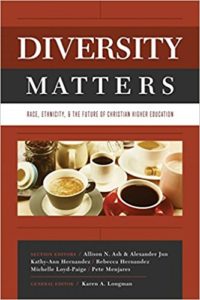 Diversity Matters: Race, Ethnicity, and the Future of Christian Higher Education edited by Karen Longman (ACU Press) $29.99 We have already announced an award for this book in our previous year’s end listings, under the category of “Best Book” about higher education. In a list of significant books released this year about racial justice, this one must be listed again as it is so very good. In case you missed it, here is what I wrote last week about it in BookNotes naming it as award winning:
Diversity Matters: Race, Ethnicity, and the Future of Christian Higher Education edited by Karen Longman (ACU Press) $29.99 We have already announced an award for this book in our previous year’s end listings, under the category of “Best Book” about higher education. In a list of significant books released this year about racial justice, this one must be listed again as it is so very good. In case you missed it, here is what I wrote last week about it in BookNotes naming it as award winning:
The minute I heard about this big volume from the CCCU (the Council for Christian College and Universities, I was overjoyed as it is so very urgently needed. And in the moments I first saw it I knew I’d want to award it one of our Best Books awards. I can assure you there is nothing in print like it; nothing even close. It is excellent.
I know several people who work hard in the context of uniquely Christian colleges and university at making their campuses safe and welcoming for all sorts of folks. Most have African American, Latino/Latina, Asian-American, and Native American students and — for reasons that might be obvious when we think of the vastness of the global church – they also have students from all over the world. Cultural, ethnic, and racial inclusion at Christ-honoring colleges is a big deal, complex, and leaders of these schools know it. Most want to be Christ-like and gracious and the best are working to do what they think they should to advance the cause of diversity and inclusion.
This amazing book offers five key sections. There are campus case studies showing how institutions can be transformed with a commitment to diversity; another section offers lessons of resiliency and leadership from long-term CCCU diversity professionals, and a section called “voices from our friends” is where minority students and staff speak for themselves. There is a section that offers curricular and co-curricular initiatives that might enhance diversity awareness and action within Christian higher education and a section on auto-ethnographies where emerging leaders and others are invited to tell about career stages. There are discussion questions at the end of each section, mostly, it seems, for faculty, administrators, and staff.
There is much more that should be said about this thick book about the diversity initiative within the CCCU. We are honored to stock it, eager to promote it, and are utterly sincere in offering it a place on our list of the Best Books of 2017. Hats off to Longman and her team, Allison N. Ashe & Alexander Jun, Kathy-Ann Hernandez, Rebecca Hernandez, Michelle Loyd-Paige and Pete Menjares. You’re the best!
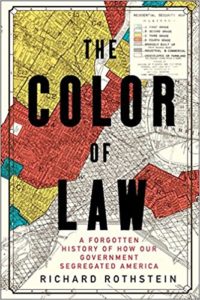 The Color of Law: A Forgotten History of How Our Government Segregated America Richard Rothstein (W.W. Norton) $27.95 This fairly academic work explores in scholarly detail how legal biases, institutional forces and even legal codes created segregation. It makes a powerful, detailed case that the Supreme Court failed (as one reviewer put it), “to understand the extent to which residential racial segregation in our nation is not the result of private decisions by private individuals, but is the direct product of unconstitutional government action.”
The Color of Law: A Forgotten History of How Our Government Segregated America Richard Rothstein (W.W. Norton) $27.95 This fairly academic work explores in scholarly detail how legal biases, institutional forces and even legal codes created segregation. It makes a powerful, detailed case that the Supreme Court failed (as one reviewer put it), “to understand the extent to which residential racial segregation in our nation is not the result of private decisions by private individuals, but is the direct product of unconstitutional government action.”
Other reviewers have called it “meticulous”, “masterful”, “wonderful, important” “a must-read” and more. It is a page-turner, for sure, and one of those rare books that offers detail analysis and yet is passionate and compelling.
The eminent scholar William Julius Wilson says that, “Rothstein has presented what I consider to be the most forceful argument ever published on how federal, state, and local governments gave rise to and reinforced neighborhood segregation.”
He also says that The Color of Law “will be discussed and debated for many decades.”
And that, my friends, is why we stock it, and why we honor it now. It is one of the most important books in this field.
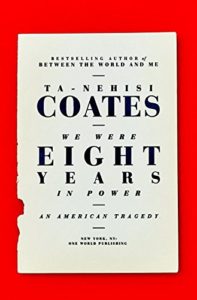 We Were Eight Years In Power: An American Tragedy Ta-Nehisi Coates (One World) $28.00 If just two or three years ago we had the horror of what seemed like monthly killings of usually unarmed black males by police, the uprisings at Ferguson, MO, and the formation of Black Lives Matters and other such activist movements, the last two years also saw the rise to massive fame of the now best-selling author Ta-Nehisi Coates. We have long commended his wonderfully written and riveting coming-of-age in Baltimore memoir, The Beautiful Struggle, and his eloquent, passionate Between the World and Me won the prestigious American Book Award in 2015. He is a well-respected writer for The Atlantic and an esteemed public intellectual.
We Were Eight Years In Power: An American Tragedy Ta-Nehisi Coates (One World) $28.00 If just two or three years ago we had the horror of what seemed like monthly killings of usually unarmed black males by police, the uprisings at Ferguson, MO, and the formation of Black Lives Matters and other such activist movements, the last two years also saw the rise to massive fame of the now best-selling author Ta-Nehisi Coates. We have long commended his wonderfully written and riveting coming-of-age in Baltimore memoir, The Beautiful Struggle, and his eloquent, passionate Between the World and Me won the prestigious American Book Award in 2015. He is a well-respected writer for The Atlantic and an esteemed public intellectual.
Toni Morrison has famously said:
I’ve been wondering who might fill the intellectual void that plagued me after James Baldwin died. Clearly it is Ta-Nehisi Coates.
Of course, not all have agreed. Many whites and a few blacks have thought his relentlessly searing work overstates the power of racism in our culture, and, for other reasons, Cornell West has recently lead a serious critique of his authority within the black intellectual tradition. Coates’ atheism hasn’t enabled him to construct any sort of hope, it seems, and lyrical as his prose is, there is, for many, something amiss.
Which, I’d say, is another reason he is a must-read, essential author for anyone wanting to be a son or daughter of Issachar. He is one of those public figures with powerful writing abilities and significant intellectual powers that his made his work crucial. And he is being discussed widely. His work is very, very significant.
We Were Eight Years in Power is a potent collection of eight major pieces he had previously written, and each has been published previously in The Atlantic. They are cleverly arranged as notes from eight years – you will have to study for yourself to know all that that is about. For what it is worth, the design of the cover evokes the autobiography of Frederick Douglas and there is, as always, good history here.
At the very least, know that Coates, who claims there was joy in doing this work, says this:
Each of the essays in the book takes up some aspect of an ongoing argument, mostly in my own head, about the utility and place of Good Negro Government. They are me in motion, thinking matters through, a process that continues even as I write this introduction. I do not doubt, for instance, that, say, wearing a suit and tie affects how some sectors of people react to one another. I’m just not sure that lack of a suit and tie is the real problem. (In terms of Good Negro Government, Barack Obama was the best of us. And when he left office, a majority of the opposition party did not believe he was a citizen.)
He tells in the introduction a bit about the structure of the book.
Before each of these essays there is a kind of extended blog post, one that attempts to capture why I was writing and where I was in my life at the time. Taken together they form a loose memoir, one that I hope enhances the main pieces. At the end of the book, there is an epilogue that attempts to assess the post-Obama age in which we now find ourselves.
Agree or not with his arguments, appreciate or not his often vivid prose, this is a book that is nearly magisterial and surely deserves to be on any serious Best of 2017 list.
By the way, just for fun, here is a link to Time magazine’s review, describing the endpapers and design of this book. There are more extensive/critical reviews, but I found this part interesting; here’s an excerpt:
The symbolism in Ta-Nehisi Coates’ new book, We Were Eight Years in Power, runs cover to cover, starting with the binding materials. The book’s endpapers, that wallpaper glued to the inside cover, are both adhesive and cohesive, serving as a visual table of contents and tone-setting allegory.
The design is toile, the whitest of white-bread decor, a textile steeped in colonialism and cotton. Coates chose illustrator Dan Funderburgh’s subversion of the traditional form to complement other historical allusions (including the cover design, which Coates wanted to reference the autobiography of Frederick Douglas.) Then there’s the word itself — toile. An e away from “work.”
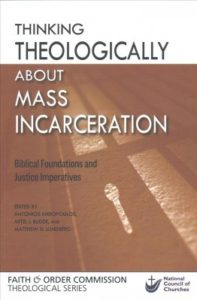 Thinking Theologically About Mass Incarceration: Biblical Foundations and Justice Imperatives edited by Antonios Kireopoulos, Mitzi J. Budde, and Matthew D. Lundberg (Paulist Press) $39.95 Those who have been involved in prison and criminal justice reform have for years been using the term “mass incarceration” largely because of the must-read, seminal work, The New Jim Crow by Michelle Alexander. (For those seriously interested in that, by the way, see the recently published major critique called Locked In: The True Causes of mass Incarceration and How to Achieve Real Reform by John F. Pfaff (Basic Books; $27.99 which has gotten very significant reviews for being a rigorous, “game-changer” for understanding this issue.)
Thinking Theologically About Mass Incarceration: Biblical Foundations and Justice Imperatives edited by Antonios Kireopoulos, Mitzi J. Budde, and Matthew D. Lundberg (Paulist Press) $39.95 Those who have been involved in prison and criminal justice reform have for years been using the term “mass incarceration” largely because of the must-read, seminal work, The New Jim Crow by Michelle Alexander. (For those seriously interested in that, by the way, see the recently published major critique called Locked In: The True Causes of mass Incarceration and How to Achieve Real Reform by John F. Pfaff (Basic Books; $27.99 which has gotten very significant reviews for being a rigorous, “game-changer” for understanding this issue.)
For several years the NCC participated in a multi-lateral dialogue on the questions of mass incarceration, exploring the line from old Jim Crow, the war on drugs, to massive amounts of racially-tainted incarcerations. Drawing on three themes – Biblical Foundations, How Theology Informs Justice, and How Justice Informs Theology – their study and reflection and activism lead to this book. As with other NCC efforts, this book is edited by a happy diverse team – Kireopoulos is Orthodox, Budde is ELCA (Lutheran) and Lundberg is CRC (Christian Reformed Church.) That the publisher is Roman Catholic is also a nice feature.
These essays are academic and radical. They invite the churches to more seriously grapple with this incarceration epidemic and to resist racism boldly. It can take its place next to the 2014 volume Redeeming a Prison Society: A Liturgical & Sacramental Response to Mass Incarceration by Amy Levad (Fortress; $39.00) and the forthcoming Rethinking Incarceration: Advocating Justice That Restores by Dominique DuBois Gilliard (IVP; $17.00 – due in February 2018.) Thinking Theologically About Mass Incarceration is a significant ecumenical document and we are very glad to honor it.
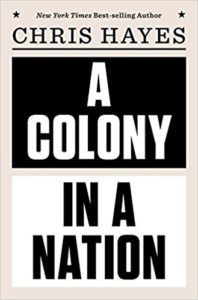 A Colony in a Nation Chris Hayes (Norton) $26.95 I heard Chris Hayes first on NPR and was riveted by his analysis, his knowledge, his eloquence, his obvious grasp of large, large issues in our culture, society, and, particularly, in our policing. The publisher says this to explain the thesis of this important work:
A Colony in a Nation Chris Hayes (Norton) $26.95 I heard Chris Hayes first on NPR and was riveted by his analysis, his knowledge, his eloquence, his obvious grasp of large, large issues in our culture, society, and, particularly, in our policing. The publisher says this to explain the thesis of this important work:
America likes to tell itself that it inhabits a postracial world, yet nearly every empirical measure ― wealth, unemployment, incarceration, school segregation ― reveals that racial inequality has barely improved since 1968, when Richard Nixon became our first “law and order” president. With the clarity and originality that distinguished his prescient bestseller, Twilight of the Elites, Chris Hayes upends our national conversation on policing and democracy in a book of wide-ranging historical, social, and political analysis.
Hayes contends our country has fractured in two: the Colony and the Nation. In the Nation, we venerate the law. In the Colony, we obsess over order, fear trumps civil rights, and aggressive policing resembles occupation. A Colony in a Nation explains how a country founded on justice now looks like something uncomfortably close to a police state. How and why did Americans build a system where conditions in Ferguson and West Baltimore mirror those that sparked the American Revolution?
A Colony in a Nation examines the surge in crime that began in the 1960s and peaked in the 1990s, and the unprecedented decline that followed. Drawing on close-hand reporting at flashpoints of racial conflict, as well as deeply personal experiences with policing, Hayes explores cultural touchstones, from the influential “broken windows” theory to the “squeegee men” of late-1980s Manhattan, to show how fear causes us to make dangerous and unfortunate choices, both in our society and at the personal level. With great empathy, he seeks to understand the challenges of policing communities haunted by the omnipresent threat of guns. Most important, he shows that a more democratic and sympathetic justice system already exists ― in a place we least suspect.
A Colony in a Nation is an essential book ― searing and insightful ― that will reframe our thinking about law and order in the years to come.
Many have noted that this is forceful and important, a major book, even “vital for our survival as a nation” one reviewer said.
Here is what Ta-Nehisi Coates says of it:
A Colony in a Nation is a highly original analysis of America’s arbitrary and erratic criminal justice system. Indeed, by Hayes’s lights, the system is not erratic at all ― it treats one group of Americans as citizens, and another as the colonized. This is an essential and groundbreaking text in the effort to understand how American criminal justice went so badly awry.
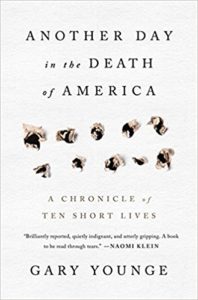 Another Day in the Death of America: A Chronicle of Ten Short Lives Barry Younge (Nation Books) $25.99 I have pondered whether I should award this a “Best Book of 2017” award, and there is no doubt in my mind that I should. For sheer excellence in powerful, creative, non-fiction reportage of ten (youthful) gun deaths on one day, it should surely be known as simply extraordinary coverage. Like other respected books of passionate, sociological, investigative journalism such as Evicted: Poverty and Profit in the American City by Matthew Desmond (which we awarded as one of the best books of 2016) or Dan Barry’s unforgettable The Boys in the Bunkhouse: Servitude and Salvation in the Heartland (again, one of the very best of 2016) Barry Younge’s painstaking detail and excellent storytelling put into place a document so powerful one can hardly stand to read it.
Another Day in the Death of America: A Chronicle of Ten Short Lives Barry Younge (Nation Books) $25.99 I have pondered whether I should award this a “Best Book of 2017” award, and there is no doubt in my mind that I should. For sheer excellence in powerful, creative, non-fiction reportage of ten (youthful) gun deaths on one day, it should surely be known as simply extraordinary coverage. Like other respected books of passionate, sociological, investigative journalism such as Evicted: Poverty and Profit in the American City by Matthew Desmond (which we awarded as one of the best books of 2016) or Dan Barry’s unforgettable The Boys in the Bunkhouse: Servitude and Salvation in the Heartland (again, one of the very best of 2016) Barry Younge’s painstaking detail and excellent storytelling put into place a document so powerful one can hardly stand to read it.
You may know his name from other good nonfiction books, especially The Speech: The Story Behind Dr. Martin Luther King Jr.’s Dream which was a very interesting and helpful story.
Another Day in the Death of America: A Chronicle… is not a study of race or poverty: gun deaths can kill anyone (as the story of my own family tree reveals.) However, in America, with its exceedingly high rate of gun murders – unusually, weirdly, grossly, high among the nations! — poverty and race are often somehow involved, at least related. (As we learn from other powerful non-fiction studies, such as Ghettoside: The True Story of Murder in America by Jill Leovy, sometimes there is institutional racism coloring which crimes are investigated and which urban murders are solved even if the crime itself was not racially motivated.)
Still, even though Another Day in the Death of America is not about racism, or police violence (a la Michael Brown or Trayvon Martin and the like) it seemed right to list it here as it becomes a glimpse into the lives of several families of color. It is harrowing, searing, heartbreaking. As Naomi Klein says, it is “brilliantly reported, quietly indignant, and utterly gripping. A book to be read through tears.”
It explores the seemingly inescapably cycle of violence in America and shows us what violence looks like in our land and gives us the up-close story of who the victims and their families were, and how they coped with the tragedy that unfolded around them and engulfed them.
The author, for what it is worth, was born and now lives again in the UK. He is of Barbados linage so is black. There is a certain unique angle of vision he has – in the UK, gun violence, of course, is much, much less common, and yet, he is not your typical Brit that looks like somebody from Downtown Abby. He is a caring writer, a passionate advocate, a decent person who is outraged by the ubiquitous gun violence and our timid response to it. The book, though, is not about policy or politics but about families, often poor families of color, disproportionately so. It is just another day in our land, and his writing exposes the horror of it, story by story by story.
As Younge tells us in a powerful, powerful, introduction, he has chosen, at random, one day in the life of America and reports, the best he could, about the gun violence murders – all were kids or young people – that occurred on that day. It could have been any day, he reminds us, as these are the averages in American, of a ten or so kids killed each and every day. As The Guardian review said, it is “a sharp portrait of America, written in blood.”
TWO IMPORTANT BOOKS NOW OUT IN REVISED EDTIONS
It is always good when classic books are revisited, maybe even revised and re-issued. Late this year two older best-selling titles that had been unavailable for a while were re-released. These deserve to be applauded, so we celebrate by adding them to our list of important books of 2017.
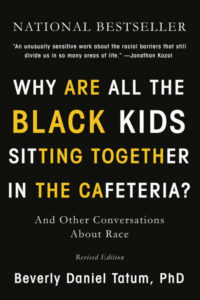 Why Are All The Black Kids Sitting Together In The Cafeteria — And Other Conversations About Race (Revised and Updated) Beverly Daniel Tatum (Basic Books) $18.99 This first came out, believe it or not, 20 years ago and was considered a landmark publication; those with keen knowledge about schooling and race, such as Jonathan Kozol, raved, calling it “an unusually sensitive work…” Earl Lewis of the Andrew W. Mellon Foundation says “Twenty years later, this updated edition is a fresh, poignant, and timely as ever.” This is a helpful study, highly recommended for those thinking about racial identity and more.
Why Are All The Black Kids Sitting Together In The Cafeteria — And Other Conversations About Race (Revised and Updated) Beverly Daniel Tatum (Basic Books) $18.99 This first came out, believe it or not, 20 years ago and was considered a landmark publication; those with keen knowledge about schooling and race, such as Jonathan Kozol, raved, calling it “an unusually sensitive work…” Earl Lewis of the Andrew W. Mellon Foundation says “Twenty years later, this updated edition is a fresh, poignant, and timely as ever.” This is a helpful study, highly recommended for those thinking about racial identity and more.
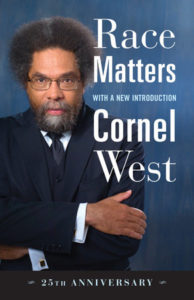 Race Matters: 25th Anniversary Edition Cornel West (Beacon Press) $15.00 Wow, this must-read classic was first released in 1993 on the even of the one-year anniversary of the Los Angeles riots. It became a national best-seller and one of the most talked about books of its kind. West, an exceptionally erudite, radically Christian philosopher, adds a serious new introduction to this new edition where he (not surprisingly) argues that “we are in the midst of a spiritual blackout characterized by imperial decline racial animosity, and unchecked brutality and terror, as seen in Baltimore, Ferguson, and Charlottesville.” In powerful, prophetic ways, he calls for a moral and spiritual awakening linked to the Movement for Black Lives, Standing Rock, and the Black freedom tradition. This is important.
Race Matters: 25th Anniversary Edition Cornel West (Beacon Press) $15.00 Wow, this must-read classic was first released in 1993 on the even of the one-year anniversary of the Los Angeles riots. It became a national best-seller and one of the most talked about books of its kind. West, an exceptionally erudite, radically Christian philosopher, adds a serious new introduction to this new edition where he (not surprisingly) argues that “we are in the midst of a spiritual blackout characterized by imperial decline racial animosity, and unchecked brutality and terror, as seen in Baltimore, Ferguson, and Charlottesville.” In powerful, prophetic ways, he calls for a moral and spiritual awakening linked to the Movement for Black Lives, Standing Rock, and the Black freedom tradition. This is important.
A SPECIAL MENTION AND THANK YOU TO PUBLISHER INTERVARSITY PRESS

If you read our BookNotes newsletter, or even have viewed these three parts of Best Books of 2017, you can notice that we here at Hearts & Minds read widely, promote a number of different sorts of books by a wide variety of publishers, and don’t mind honoring books that are theologically unlike one another. We appreciate various views but, mostly, we appreciate books that are serious, but not too scholarly, thoughtful and not merely spouting a party line, but yet Biblically and theologically reliable, sensible, orthodox. And, we are grateful for publishers who can stand within that great, broad, historically orthodox tradition and speak with relevance and power about God’s transforming vision for seeking all of life touched by Christ’s Kingdom, and do it with good, graceful writing that is pleasant to read.
 InterVarsity Press (IVP) does that as consistently as any, but in this area of racial reconciliation and multi-cultural ministry, they have been as pro-active as any, publishing more books on race than any other religious publisher I know. I know (because we researched it) that there were some years when they were the only evangelical publishing books on this topic. We have noticed and admired their consistent commitment to this within our industry and want to add our voices to those who are grateful.
InterVarsity Press (IVP) does that as consistently as any, but in this area of racial reconciliation and multi-cultural ministry, they have been as pro-active as any, publishing more books on race than any other religious publisher I know. I know (because we researched it) that there were some years when they were the only evangelical publishing books on this topic. We have noticed and admired their consistent commitment to this within our industry and want to add our voices to those who are grateful.
I suspect they don’t make a lot of money on these books that tend not to sell much (believe me, I know.) But I know they, like most good publishers, are in this work as a labor of love. They are called to serve God’s people, and they know this topic is central to the gospel and urgent for our times. That their particular publishing program is related to their work in campus ministry – where on most campuses, their fellowships emphasize racial diversity and ethnic leadership development – may be somewhat why they do so much on this topic. But I know for a fact that it is also because they are deeply committed to this topic as a matter of Biblical fidelity.
Besides reading the work of Martin Luther King, Jr in my formative years, IVP books were among the first faith-based books I ever saw on this topic. In the 70s there was Your God Is Too White (and others) and in the 80s there was More Than Equals by Spencer Perkins & Chris Rice. Over the decades they introduced Brenda Salter McNeil and by the new century they published Soong-Chan Rah and Nikki Toyama-Szeto and Helen Lee and George Yancey and Orlando Crespo and Christina Cleveland and Leroy Barber and Emmanuel Katongole and Ken Wytsma and now, Sarah Shin. They have published more people of color than most evangelical publishers and they continue to invite us all into deeper conversations about whole-life discipleship and thoughtful evangelical engagement in the world God so loves.
And so, we offer this heartfelt public thanks to our friends at InterVarsity Press for leading the way in Christian publishing by doing such good work on the topics of multi-ethnic ministry and racial justice and reconciliation. I pray that their books on this topic find many readers and that, together, we can be used by God to make a difference.
Martin Luther King, Jr. Day, 2018
BookNotes

SPECIAL
DISCOUNT
ANY ITEM MENTIONED
10% Off
order here
this takes you to the secure Hearts & Minds order form page
just tell us what you want
inquire here
if you have questions or need more information
just ask us what you want to know
Hearts & Minds 234 East Main Street Dallastown PA 17313
read@heartsandmindsbooks.com
717-246-3333
